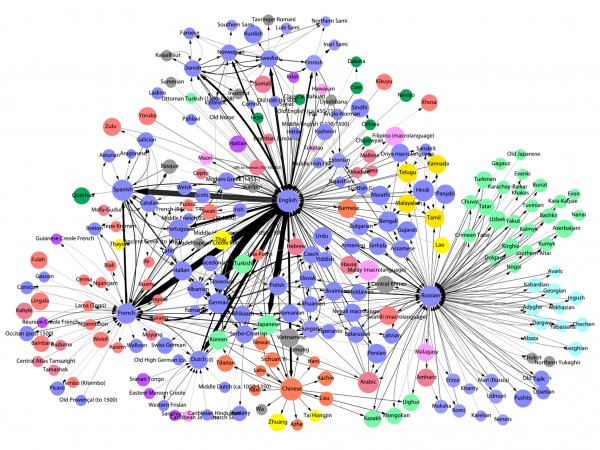Language facilitates the global flow of ideas, and elite languages in global communications are those that are both literate and online, according to new research that has mapped information flows across languages. Certain languages have been found to be much more powerful than others, because they are more and better connected within the communications networks of the world, while others are relatively weaker. Some smaller languages are stronger than languages spoken by much larger groups of people however, due to political and other reasons.
“The global influence of a language is determined by its connections to other languages, not by its number of speakers or their economic power, as these connections make possible the global transfer of ideas,” MIT’s Shahar Ronen, first author of the study, told The Speaker.

Ronen explained how some language speakers–those who speak central languages–have a disproportionate amount of power and responsibility because their communications are “tacitly shaping the way in which distant cultures see each other,” while other language groups are handicapping themselves with policies that restrict or disconnect people from global communications networks (GLNs).
“Think about it this way: if the English-speaking world did not care about the 2014 events in Ukraine, the rest of the world would have a very hard time learning about it as well.”
“A government that disconnects its people from the internet–e.g., as China does with its Great Firewall–hamstrings its ability to gain global influence,” said Ronen. “Governments concerned with boosting international soft power should invest in translating more documents and encourage more people to tweet in their national language. Contemporary China and Russia produce very few international thought leaders, and leave little legacy for future generations.”
The study generated maps of connections between communications media–including 30 years worth of book translations in 150 countries, 550 million Tweets in 73 languages, and multiple language editions of Wikipedia pages.
“We mapped three global language networks from three sources: Twitter, Wikipedia and book translations,” Ronen explained. “These sources are by no means representative of the world’s population; rather, they represent the elites that generate and propagate ideas around the world.”
The team found that the more central a given language was to the network, the more famous its speakers were predicted to be–more so than other factors such as population and wealth.
Centrality was based on both strength and number of connections, the team found. The three GLNs identified by the team centered on English as a global hub. That hub is connected to secondary hubs–Spanish, French, German, Portuguese, Chinese and Russian.
“For example, it is easy for an idea conceived by a Spaniard to reach an Englishman through bilingual speakers of English and Spanish,” said Ronen. “An idea conceived by a Vietnamese speaker, however, might only reach a Mapudungun speaker in south-central Chile through a circuitous path that connects bilingual speakers of Vietnamese and English, English and Spanish, and Spanish and Mapudungun.”
Many of the world’s people are to a degree left out of the global conversation–those who do not communicate in an elite language–and these people face profound limitations. This extends to both languages that are not spoken by relatively large amounts of people and languages are spoken by significant populations but that are limited for other reasons, Ronen said.
“The truly disenfranchised, at least as global communication is concerned, are those whose language don’t even show up on our network. That said, speakers of languages such as Chinese or Arabic, both a with low centrality given their number of speakers, are disadvantaged as well, as they are less likely to be exposed to the latest and greatest ideas in their fields and well not be able to communicate theirs globally. Consider a researcher who speaks only Chinese who will not be exposed to work by her peers abroad, or a CEO who speaks only Arabic.”
Ronen highlighted the importance of learning more than one language–particularly top elite languages.
“Learning a new language opens up a new part of the world for the learner and broadens his/her perspective. Achieving reasonable fluency in English is one of the best investments an individual in any country and any occupation can make. If you already speak English, learning another language is still valuable. If you have a specific goal such as doing business in a certain country, learning that country’s language will be highly beneficial.
“If you’re looking for a language that can open new opportunities for you in general, our study can inform you which languages to consider–Spanish or French are great options. From a global point of view, more multilinguals mean more and stronger connections between languages, which in turn facilitate the global flow of ideas.
The report, “Links that speak: The global language network and its association with global fame” was completed by Shahar Ronen, Bruno Gonçalves, Kevin Z. Hu, Alessandro Vespignani, Steven Pinker, and César A. Hidalgo.
